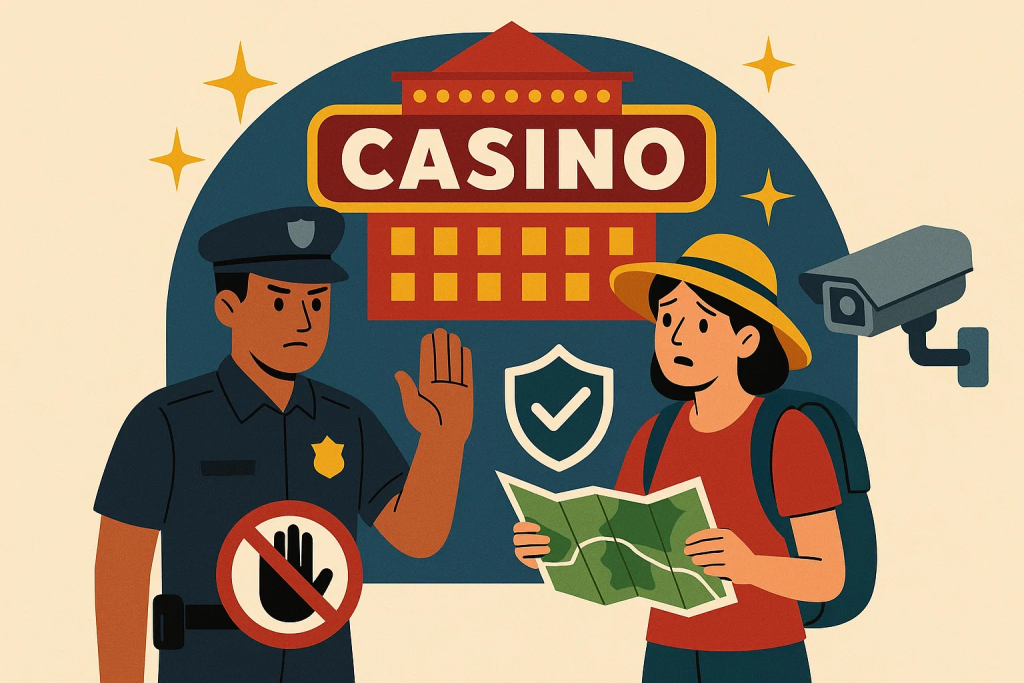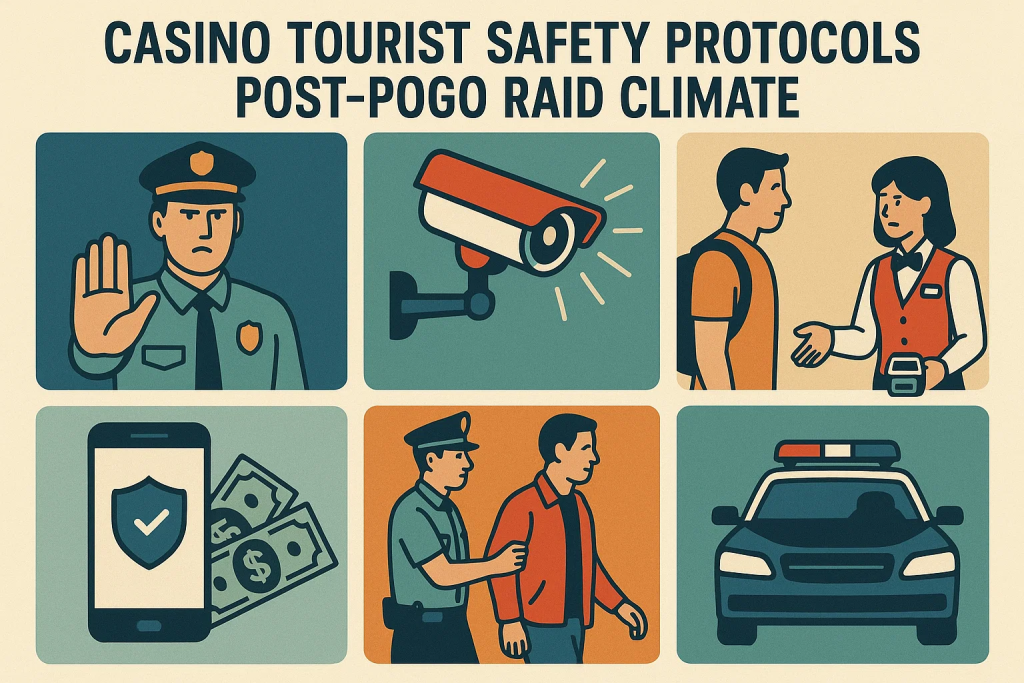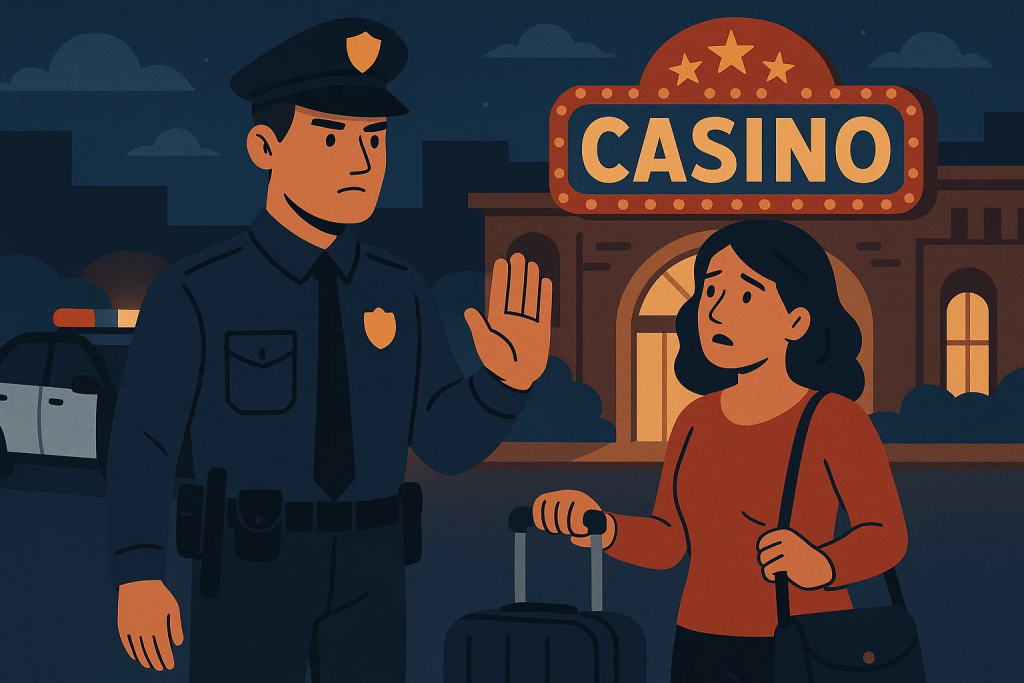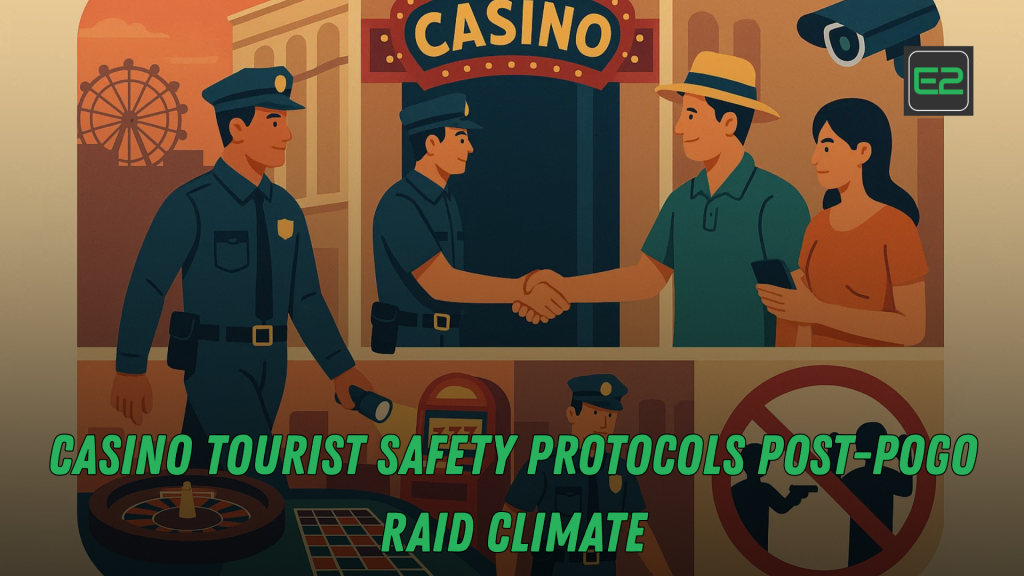Table of Contents
Short version: Licensed casinos in Manila, Clark, Cebu, and other Philippine hubs are open and operating with tighter guest protection than in years past. After high-profile raids on illegal offshore hubs and unlicensed gaming compounds, the mainstream tourism corridor has doubled down on identity checks, cash-handling controls, on-floor security, and guest education. If you know how to verify a legitimate venue, travel smart from airport to casino, and stick to simple safety routines, your trip can be both fun and low-risk.

1) The New Normal: What Actually Changed for Casino Tourists
Over the last couple of years, Philippine authorities targeted illegal offshore gaming hubs and unlicensed dens, separate from the licensed land-based casinos that tourists visit. That enforcement wave produced three durable shifts you’ll feel on your next trip:
- More visible security and training. Expect uniformed guards in public areas, clearer queuing at entrances, and professional responses to disputes on the floor. Security teams have refreshed playbooks around guest escorts, suspicious behavior reporting, and off-property solicitation.
- Stricter identity and cash protocols. Casinos are “covered persons” under local anti-money laundering rules. That means Know Your Customer (KYC) checks at entry or cage, routine questions about unusually large buy-ins or cash-outs, and precise receipt discipline. It’s not about hassling you; it’s about protecting the venue and its guests.
- Sharper line between legal and illegal. Licensed casinos are located inside integrated resorts and registered properties with obvious branding, formal entry points, staffed cages, and surveillance everywhere. Illegal setups tend to be “private villas,” warehouses, or office parks advertised by word of mouth. Tourists who stay inside the licensed ecosystem enjoy predictable standards and support.
Bottom line for travelers: You’ll see more process, less ambiguity. The payoff is a safer, calmer experience—provided you stick to licensed properties.
2) What Counts as “Licensed” vs. “Risky”? A Quick Visual Test
You don’t need to be an industry insider to tell the difference. Use the following street-smart cues:
- Where is it?
- Licensed: Inside a known hotel or integrated resort; clearly branded; easy to find on a city map; orderly drop-off and lobby.
- Risky: Standalone “VIP villa,” warehouse compound, or office tower with side-door access and unmarked elevators.
- How do you enter?
- Licensed: Formal checkpoints; age and ID verification; security visible and polite; guest services desk.
- Risky: No age checks; back-alley entrances; pitchy touts promising “better odds” or “rebates.”
- How is money handled?
- Licensed: Staffed cage; printed receipts for buy-ins/color-ups; chip controls; transaction logs.
- Risky: Ad-hoc cash-handlers; vague “we’ll wire you later” arrangements; pressure to skip the cage.
- What does the floor look and feel like?
- Licensed: CCTV fields of view everywhere; clear pit supervision; alert staff; medical response nearby.
- Risky: Sparse cameras, unbadged bouncers, inattentive dealers, or chaotic table management.
If you hesitate even a beat, ask the hotel concierge to confirm the casino is licensed. That simple step saves headaches.
3) Pre-Trip Checklist: The 10-Minute Plan That Prevents 90% of Problems
1) Choose the property first, then your flights.
Stick to recognized integrated resorts and registered provincial casinos. Lock the hotel-casino loop before you book nightlife.
2) Arrange airport transfers.
Use hotel cars or app-based rides. Avoid “special cash rides” from unofficial drivers who suggest offsite gambling.
3) Pack IDs properly.
Bring your passport (if foreign national) or government ID (locals). Keep a photocopy on hand and a digital scan in your phone’s secure folder.
4) Set a bankroll architecture.
Bring a balance of card, ATM access, and modest cash. Tell your bank you’re traveling so transactions clear. Large cash movements may be questioned—this is normal and protects everyone.
5) Save emergency and hotel contacts.
Store your hotel’s front desk and security numbers. Remember the national emergency number, and add your embassy or consulate if you’re visiting from overseas.
6) Enable device security.
Use a six-digit passcode or biometric unlock; turn on “Find my device” features; avoid sideloading apps.
7) Review responsible gaming boundaries.
Set a time limit and loss limit before you arrive. Consider using the players’ club card to track sessions.
8) Pack clothing with pockets that zip or button.
On busy nights, secure your phone and wallet without relying on a handbag.
9) Bring comfortable, closed-toe shoes.
You’ll walk more than you expect; good footwear equals better decisions.
10) Screenshot reservation and ID pages.
If your phone loses signal, you still have proof of booking and identity backups.
4) What to Expect at the Doors, the Floor, and the Cage
A) At the doors
- Bag checks for large items or event nights.
- ID verification for age and entry policies.
- Guest services directing you to the floor, cage, or players’ club.
B) On the gaming floor
- Dealer and pit rhythm that follows clear procedures; slow play or arguments are calmly managed.
- Surveillance coverage is thorough, including approaches to cash desks.
- No offsite pitches permitted. If you’re approached by someone offering “private rooms” elsewhere, inform security.
C) At the cage or credit office
- Expect KYC prompts and clear receipts.
- High-value cash movements might require a few extra questions (source of funds, contact details).
- Markers (if offered) are signed only at official counters—not in lobbies, cafés, or cars.
This level of discipline exists so that guests, staff, and brands remain safe from fraud rings, chip scams, and cash-out disputes.
5) Money, Chips, and Markers: Handle Them Like a Pro
Carry cash smartly. Bring only what you’re comfortable carrying in public areas. Use in-property ATMs in well-lit zones and shield the keypad.
Treat chips like cash. Only exchange chips at the official cage. Decline offers to swap chips for cash “to save time.” If you’re offered a “better rate,” that’s a red flag.
Keep every receipt. Take photos of buy-ins, color-ups, and any markers. If you need a win/loss statement later for personal records, having precise receipts makes it simple.
Don’t use third-party carriers. Do not hand money to a “friend of the host” or a driver to “prepare your buy-in ahead of time.” If anyone proposes a shortcut, choose the official path.
Understand identity checks. Casinos may verify who you are and ask reasonable questions tied to their compliance duties. Calm cooperation is the fastest way back to the fun.
6) Digital Hygiene: The Quiet Superpower of Safe Casino Travel
- Install only official apps. Download hotel or casino apps from a legitimate app store. Avoid third-party packages promising rebates or “secret VIP access.”
- Use trustworthy networks. Prefer hotel or casino Wi-Fi with login credentials, or your mobile data. Avoid open networks labeled “free casino wifi” with no password.
- Geo-sharing discipline. Post stories with a delay, hide real-time location tags, and don’t display room numbers or floor plans in content.
- Payments and data. Use contactless payment where possible. Never hand over your phone “for a discount scan” to an unfamiliar staffer or vendor.
- Device etiquette at tables. Follow property rules for phone use. When in doubt, put it away—nothing ruins a session like a rules misunderstanding.
7) Getting Around: Airport → Casino → Nightlife → Back
Airport to hotel/IR:
- Use the hotel car desk inside the terminal or the official ride-hailing pickup zone. Picture the car’s plate number and confirm the driver’s name before boarding.
In-city hops:
- Let your hotel hail a taxi with a record, or stick to app-based rides. Share your trip status with a friend when traveling late.
ATMs and currency exchange:
- Pick bank-branded ATMs inside malls or inside the integrated resort. Avoid street-level machines at night.
Nightlife detours:
- If you try bars or restaurants off property, pick well-known venues in commercial districts. Return before it’s too late on your first night while you orient yourself.
The universal rule:
- If a driver, promoter, or new acquaintance suggests “a better casino” offsite, decline. Your safety lives inside the licensed ecosystem.
8) Situational Awareness: Read the Room Like a Local
- Look for the lanyards. Licensed properties issue staff badges; supervisory staff are easy to identify.
- Note the cameras. You should be able to glance up and see at least one camera dome covering your area.
- Check the cage line. Clear, well-managed queues signal discipline across the house.
- Scan for signage. Responsible gaming, age limits, and property policies should be posted. A visible rules culture is your friend.
- Trust floor staff. If you’re unsure about a side-bet, table rule, or payout, ask the dealer or pit before you wager.

9) Red Flags and Scams: Five You Should Never Ignore
- “Exclusive villa casino” invitations. Illegal setups love the promise of privacy and “better odds.” Hard pass.
- Unlicensed e-gaming rooms in office parks. These overlap with non-tourist operations and may be raidable spaces.
- Chip swaps off the cage. No legitimate reason to exchange chips for cash anywhere else.
- DMs and WhatsApps with rebates. If it starts in your inbox, assume it bypasses compliance.
- Job pitches while you’re on a tourist visa. Any “online gaming work” pitch you didn’t seek is risky. Just say no.
10) If You Encounter a Raid or Police Action Nearby
- Stay calm and visible. Keep your hands open and in view. Follow instructions promptly.
- Provide ID if requested. Your cooperation helps officers separate tourists from suspects.
- Do not crowd or film at close range. Maintain distance; avoid obstructing law enforcement.
- Notify your hotel. Ask security for guidance and, if needed, assistance with transportation back.
- If you’re a foreign national: request consular contact if you are held for statements as a witness. Keep embassy numbers in your phone.
The best defense is prevention: don’t visit unverified venues where raids are more likely to occur.
11) Responsible Gaming: Safety Includes Your Decisions
- Set limits in daylight. Decide your max loss and session time before the lights, sounds, and energy of the floor tempt you to drift.
- Use a players’ card. It helps track play objectively.
- Schedule breaks. Step outside, reset, hydrate, and eat. Your brain makes clearer decisions when your body feels good.
- Avoid late-night ATM runs. Topping up after midnight when you’re tired is a common regret pattern.
- Ask about self-exclusion. If you need a pause, guest services can explain options discreetly.
12) Myths vs. Realities in the Post-Raid Era
Myth: “Casinos are less welcoming now because of all the checks.”
Reality: Staff are trained to be more welcoming and more vigilant. The goal is smoother play with fewer incidents.
Myth: “If a host offers me a private offsite room, it must be elite.”
Reality: Legit VIP play happens on property with paperwork and supervision. Offsite rooms are a classic illegal setup.
Myth: “ID checks mean I’m suspected of something.”
Reality: They’re routine guardrails for everyone. One quick check saves hours of headaches later.
Myth: “I’ll save money with a cash-only driver.”
Reality: You might save a few pesos and risk a lot more—time, safety, even legal trouble if that driver funnels tourists to illegal operations.
Myth: “If the table is busy, no one will notice a dispute.”
Reality: Surveillance and pit teams are trained for exactly that. Report issues early; they prefer to resolve small problems before they grow.
13) For Operators: A 30/60/90-Day Guest-Facing Safety Uplift
Days 1–30: Foundations
- Publish a guest safety one-pager at entrances and in rooms: age rules, ID requirements, cage rules, emergency contacts, responsible gaming options.
- Brief concierge and transport partners weekly on how to answer “Is this casino licensed?” and how to respond to offsite solicitations.
- Create a 4-segment filler pack (two to three minutes each) for technical delays: responsible gaming tips, property amenities, how to navigate the floor, upcoming events.
Days 31–60: Training and Partnerships
- Run table-side etiquette refreshers for dealers and pit bosses focused on de-escalation and guest empathy.
- Launch a coordinated watch-party protocol for sports nights to keep foot traffic separate from cash lanes.
- Start monthly tabletop exercises with local police and emergency responders.
Days 61–90: Measurement and Iteration
- Track guest-reported safety incidents, time-to-resolution, and staff response ratings.
- Audit cage receipt accuracy and coach toward 100% compliance.
- Publish a short “You said, we did” update that highlights new safety improvements based on guest feedback.
14) For Travel Planners: Package a Safe Casino Citybreak
- The Airport-IR-Airport loop. Pre-book roundtrip transfers.
- IR-only play. Keep gaming on property.
- Curated nightlife. Use vetted restaurants and performance venues, ideally inside or attached to the integrated resort.
- Briefing at check-in. Have the host cover three minutes of dos and don’ts: ID, money handling, emergency numbers.
- Check-out receipts pack. Provide a clean record of play and expenses if guests need documentation.
This productized approach reduces friction and makes first-timers feel looked after.
15) Sample Safety-First Itineraries
A) Manila Weekender (36 hours)
- Day 1 afternoon: Airport pickup, check-in, property orientation walk, early dinner.
- Evening: Two-hour table session, scheduled break, show or live music, lights-out by midnight.
- Day 2: Buffet breakfast, pool or spa, afternoon slots and table mix, dinner at signature restaurant, final short session, early transfer next morning.
B) Clark Leisure and Golf (48 hours)
- Day 1: Check-in, nine holes or driving range, dinner at the resort, early night.
- Day 2: Morning spa, midday table session, late lunch, outlet shopping, sunset drinks, short evening session.
- Day 3: Breakfast, check-out, airport transfer.
C) Cebu Foodie Run (48 hours)
- Day 1: Waterfront check-in, lechon tasting nearby, evening gaming block, dessert crawl inside the IR.
- Day 2: Island-hopping or city heritage tour, afternoon nap, prime-time table session, nightcap at a lounge on property.
- Day 3: Breakfast and transfer.
Each plan balances play with rest, food, and movement—your best defense against impulsive decisions.

Strong Call-to-Action
Travelers: Pick a licensed property, save your hotel and emergency numbers in your phone, and print the pre-trip checklist from this guide. Share the plan with your companions so everyone follows the same safety routines.
Operators: Put a guest-facing safety one-pager at every entrance and on the in-room TV channel. Rehearse two scenarios this month—“offsite solicitation reported” and “cash-out dispute.” Tell your guests what’s new; they’ll reward transparency with trust.
Mobile Legends Redefines the Amazing Female Gamers in PH: Rise to Fame
Travel planners and TMCs: Package the Airport-IR-Airport loop, include a two-minute safety briefing at check-in, and send travelers home with a clean receipts pack. Make the safe choice the easy choice.
FAQs: Casino-Tourist Safety in the Philippines (Post-Raid Climate)
1) Are licensed casinos open to tourists despite the crackdown on illegal hubs?
Yes. The enforcement focus targeted illegal offshore hubs and unlicensed dens, not the mainstream, licensed hotel-integrated casinos that attract tourists. Those venues have strengthened security and guest protection standards while operating normally.
2) Why are there more ID checks and questions at the cage now?
Casinos operate under anti-money laundering and KYC obligations. When you make unusually large cash transactions, staff may ask routine questions or log details. It’s not personal—it’s compliance and protection for guests and the property.
3) How can I quickly verify a legitimate casino?
Look for these four signals: it’s inside a well-known hotel or integrated resort, there’s visible branding and formal entry, the cage prints receipts for all transactions, and staff wear clear badges. If a driver or promoter pushes a private offsite venue, decline.
4) What should I do if someone invites me to a “members-only villa” for better rebates?
Say no and inform hotel or casino security. Legit VIP programs run on property with documented offers and supervision. Offsite invitations are classic hallmarks of illegal operations.
5) What number should I call in an emergency, and who else should I notify?
Use the national emergency hotline. Also call your hotel’s security or front desk so they can coordinate assistance and communicate with authorities if needed. Keeping both numbers saved before your trip is smart planning.
